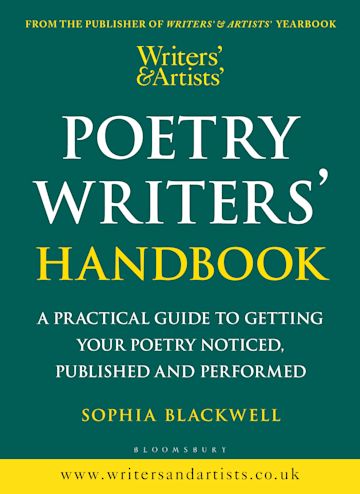In this abridged extract from the Poetry Writers' Handbook, author Sophia Blackwell shares four key pieces of advice for poets.

If you’re motivated to write, even partly, by some form of acknowledgement from the literary establishment, you need to observe some of the rules and conventions and keep yourself sane and occupied while doing so. Whether you’re tempted by publication, performance or a mixture of both, the following are my key pieces of advice.
YOU’RE NEVER TOO OLD – OR TOO YOUNG
The poetry world is full of older voices and largely respects the challenging, vital work they produce. This is starting to be backed up by official opportunities for mid-career writers regardless of age, or the recent increase in protests when an age limit is attached to a competition. The poetry world has an interesting relationship with age. Many of the poets represented on prize shortlists or established publishers’ lists are middle aged, but there is ageism in the poetry industry as there is everywhere else, and you tend to hear a lot more about debuts and young, attractive poets – like all other youthful, photogenic entrants into creative industries. It can be hard for a poet or publisher to drum up interest in a third or fourth book, compared to the excitement of a debut, even if the later book is far better. Publishers want to discover people, not to admit that they hadn’t really noticed them for years – but people also start writing poetry later in life and it can be a very fulfilling second or third act to a career or a life in general.
LOOK BEFORE YOU LEAP
On a practical note, there are some opportunities that are open to you only if you are under thirty or haven’t yet published a first collection. Some prizes and publishers may consider the first book you produce to be your first collection, even if it was self-published. You don’t get another chance at a debut, so try not to give in to the lure of self-publishing your poetry collection online immediately and with no sales strategy in place unless you already have a substantial fan-base. If you have done this, it’s not the end of the world, but experience will have taught you that this approach has its limitations. There are some things to be said for more conventional routes to publication, not least the opportunity to work with people who have insider knowledge and can steer you in the right direction, or help you see your work in a new light.

BE PATIENT – BUT KNOW YOUR WORTH
Essays on how to get your poetry published can often seem forbidding, focusing on the patience you need and encouraging you to return to your file of drafts and put in some more edits before you even think about sending out your work. These are essays from publishers who’ve seen a lot of unpublishable writing, and they know what they’re talking about. Leaving your drafts in a drawer for a couple of weeks, or longer, will improve them when you take them out and look at them again. You will be able to see the errors more easily. That title you wrote the whole poem for, or the line you shaped it around? That’s probably the first thing to go! There is no cure for waiting, but there are things you can do in the meantime to prepare yourself and limber up to bring the final version of that poem or manuscript out into the world. The next two chapters focus entirely on poetry publication, from submitting to magazines and competitions to publishing pamphlets or chapbooks followed by first and second collections. Even if you do not intend to follow this linear route, you will be able to find some workarounds, and may want to combine or replace some of these routes to market with self-publishing or video and audio performance, both of which I’ll also explore.
LEARN TO PERFORM YOUR POETRY
You don’t necessarily have to memorise your work, though I’d recommend doing so with a couple of shorter pieces if you can, so if you get stuck on stage you can pull something out of the bag. Importantly, performing your poetry can also be an act of editing – you can be half-way through a piece and realise that a line or whole verse doesn’t work. While performing, the sensations in your body and the audience reactions can tell you things that the act of solitary composition just does not. Finally, learning to perform your poetry is an act of courtesy to the audience that elevates an event from a ‘reading’ to a happening, something people will remember. Performance is not just there to hide a multitude of writerly sins; it is a discipline of its own and one that deserves the same respect as delivering a Shakespeare soliloquy at the Globe or a ten-minute stand-up set at the Apollo. Your writing will change over time and so will the audience reaction to you and your work. You have limited control over those things but learning some rudimentary performance skills will never let you down. This book includes two chapters on performance poetry, with the first one focusing on how it became a phenomenon in the US and the UK and the second one focusing on practicalities, including how to deliver a successful live reading and perhaps move into running your own events.
This article is an abridged extract from the Poetry Writers' Handbook, available to pre-order at Bloomsbury.com.
Sophia Blackwell is a performance poet with three published collections of poetry and is the author of a novel. Her poetry has been anthologised by Bloodaxe, Nine Arches and the Emma Press among others, and between Autumn 2019 and and 2021, she hosted the LGBT+ radio show Out in South London on Resonance FM, showcasing gay, lesbian, bisexual and trans authors, musicians, comedians and other creatives like her.
Recent notable gigs include four times at Glastonbury on the Poetry & Words Stage, Women of the World (WOW) Festival at the South Bank Centre and headlining a national tour with Hammer and Tongue. She is a Literary Death Match champion, Spread the Word LGBT Hero and Diversity Role Model. She was the Former Chair of Poetry London and is a freelance editor and the current Chair of the Pride Network at Hachette UK.
This book has two chapters about performance poetry. The first one is about how it became popular in the US and UK, and the second one is about how to do things like give a good live reading and maybe even start your own events.